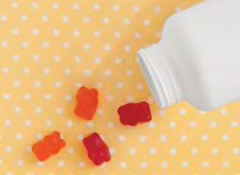Sign In

Menu
Suggested Searches
Recent Searches
Suggested Searches
Product Ratings
Resources
Chat With AskCR
Resources
All Products A-ZThe payment for your account couldn't be processed or you've canceled your account with us.
Re-activateMy account
Sign In
My account
Sign In


Experts stress that a child's primary nutrition should come from a balanced diet rich in fruit, vegetables, and whole grains, but in some cases your doctor might recommend adding supplemental nutrients.
Talk wth your pediatrician about your child's needs, and see our advice below on vitamins and supplements for children. For you, see our advice on vitamins and supplements for adults.
Don't let Junior pick the product. Children may be influenced by advertising or packaging, so to avoid being pestered, consider shopping online or by yourself in a store. Choose vitamins or supplements that have undergone a third-party verification process, such as those listed on ConsumerLab.com or NSF International or the U.S. Pharmacopeial Convention.
Skip sports drinks or nutrition bars. The American Academy of Pediatrics (AAP) recently warned adults not to give children sport drinks and said energy drinks shouldn't be consumed by children or adolescents. And because nutrition bars—even "kid-friendly" ones—tend to be highly fortified, it is possible for a child who eats them regularly to get too much vitamin A, for example, or too much vitamin B6. On top of the expense, bars can't take the place of real food, including fruit, vegetables, and whole grains, which are vital to a child's health and development.
Don't overlook vitamin D. In 2008 the AAP doubled the amount of vitamin D it recommends for infants, children, and adolescents to 400 international units (IU). The Institute of Medicine recommends 600 IU daily for children ages 1 and up. That's significant: Your child gulps down about 120 IU in a cup of fortified milk. Most infants will need a vitamin D supplement, but breast-fed babies require it for a longer period of time. And deficiency can happen at any age, so ask your child's doctor what's best.
Factor in fatty acids. Omega-3s are not just for grown-ups. Your child's brain loves these fatty acids, which help keep synapses firing and cell membranes fluid. So feed your child low-mercury fish regularly and ask your pediatrician whether a supplement makes sense.
Keep track of your little one's needs. The nutritional requirements for growing children can change. Stay on top of what's essential by consulting your pediatrician at regular checkups and by exploring the U.S. Department of Agriculture's Food and Nutrition Information Center (click on "See nutrient recommendations by age and gender") and the dietary-supplement fact sheets and dietary-reference intakes from the Office of Dietary Supplements at the National Institutes of Health.
This report was made possible by a grant from the Airborne Cy Pres Fund, which was established through a legal settlement of a national class-action lawsuit (Wilson v. Airborne Health, Inc., et al.) regarding deceptive advertising practices.
 WASHING MACHINE REVIEWS
WASHING MACHINE REVIEWS GENERATOR REVIEWS
GENERATOR REVIEWS
 Build & Buy Car Buying Service
Build & Buy Car Buying Service
Save thousands off MSRP with upfront dealer pricing information and a transparent car buying experience.
 Get Ratings on the go and compare
Get Ratings on the go and compare
while you shop

